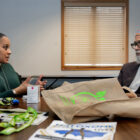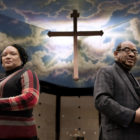Disparities
Churches And Health Care Align To Offer Trusted Space For Addiction Treatment
|
In the basement of Madry Temple Church in New London, Margaret Lancaster, a health program coordinator at Ledge Light Health District, shows the pastor how to administer Narcan, the opioid overdose reversal treatment. In New Haven, at the Dixwell Avenue Congregational United Church of Christ, the Rev. Jerry Streets and local clinical staff are offering substance use disorder treatment. These alliances of frontline health care workers with trusted community leaders are addressing the alarming rise of substance use disorders by leveraging the cultural power of churches to reach people in need of help. Overdose mortality rates have risen among all races in Connecticut over the past three years. But the rise has been particularly marked among the Black population.

